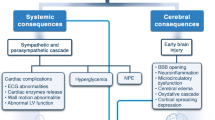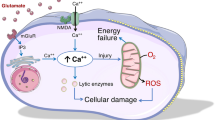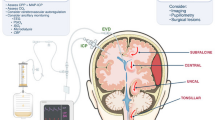Opinion statement
Increased intracerebral pressure with lethal herniation still accounts for high mortality rates in patients with massive strokes. Patients that are likely to develop increased intracranial pressure can often be identified within the first few hours after stroke onset. Although medical management seems to fail in most of these patients, early hemicraniectomy and induced moderate hypothermia (32°C to 33°C) represent two novel therapeutic approaches to improve neurologic outcomes and decrease mortality rates.
Similar content being viewed by others
References and Recommended Reading
Frank JI: Large hemispheric infarction, deterioration and intracranial pressure. Neurology 1995, 45:1286–1290.
Hacke W, Schwab S, Horn M, et al.: Malignant middle cerebral artery territory infarction: clinical course and prognostic signs. Arch Neurol 1996, 53:309–315.
Berrouschot J, Sterker M, Bettin S, et al.: Mortality of space-occupying (‘malignant’) middle cerebral artery infarction under conservative intensive care. Intensive Care Med 1998, 24:620–623.
Buchan AM, Lesiuk H, Barnes KA, et al.: AMPA antagonists: do they hold more promise for clinical trials than NMDA antagonists. Stroke 1993, 24(suppl):I148-I152.
Iversen LL, Lees KR: Excitatory amino acid antagonists. Baillièreś Clinical Anaestesiology 1996, 10:481–496.
Dempsey, Combs DJ, Maley ME, et al.: Moderate hypothermia reduces postischemic edema development and leukotriene production. Neurosurgery 1987, 21:177–181.
Hess DC, Zhao W, Carroll J, et al.: Increased expression of ICAM-1 during reoxygenation in brain endothelial cells. Stroke 1994, 25:1463–1468.
DelZoppo GJ, Hallenbeck JM: Advances in the vascular pathophysiology of ischemic stroke. Thromb Res 2000, 98:73–81. This excellent review summarizes the latest findings on endothelial-leukocyte interactions during ischemia and with reperfusion.
Rosenberg GA: Ischemic brain edema. Prog Cardiovasc Dis 1999, 42:209–216.
Ropper AH, Shafran B: Brain edema after stroke: clinical syndrome and intracranial pressure. Arch Neurol 1984, 41:26–29.
Schellinger P, Fiebach J, Jansen O, et al.: Stroke magnetic resonance imaging within 6 hours after onset of hyperacute cerebral ischemia. Ann Neurol 2001, 49:460–469. Important paper on the role of magnetic resonance imaging as an early predictor in hemispheric stroke.
Feldman Z, Kanter MJ, Robertson CS, et al.: Effect of head elevation on intracranial pressure, cerebral perfusion pressure, and cerebral blood flow in head injured patients. J Neurosurg 1992, 76:207–211.
Azzimondi G, Bassein L, Nonino F, et al.: Fever in acute stroke worsens prognosis: a prospective study. Stroke 1995, 26:2040–2043.
Wang Y, Lim LLY, Levi C, et al.: Influence of admission body temperature on stroke mortality. Stroke 2000, 31:404–409.
Berger L, Hakim AM: The association of hyperglycemia with cerebral edema in stroke. Stroke 1986, 17:865–871.
Norris JW, Hachinski VC: High dose steroid treatment in cerebral infarction. Br Med J 1986, 292:21–23.
Schwarz S, Schwab S, Bertram M, et al.: Effects of hypertonic saline hydroxyethyl starch solution and mannitol in patients with increased intracranial pressure after stroke. Stroke 1998, 29:1550–1555.
Kaufmann AM, Cardoso ER: Aggravation of vasogenic cerebral edema by multiple-dose mannitol. J Neurosurg 1992, 77:584–589.
Sutton LN, McLaughlin A, Dante S, et al.: Cerebral venous oxygen content as a measure of brain energy metabolism with increased intracranial pressure and hyperventilation. J Neurosurg 1990, 73:927–932.
Muizelaar JP, Marmarou A, Ward JD, et al.: Adverse effects of prolonged hyperventilation in patients with severe head injury: a randomized clinical trial. J Neurosurg 1991, 75:731–739.
Schwab S, Aschoff A, Spranger M, et al.: The value of intracranial pressure monitoring in acute hemispheric stroke. Neurology 1996, 47:393–398.
Carter BS, Ogilvy CS, Candia GJ, et al.: One-year outcome after decompressive surgery for massive nondominant hemispheric infarction. Neurosurgery 1997, 40:1168–1176.
Rieke K, Schwab S, Krieger D, et al.: Decompressive surgery in space occupying hemispheric infarction: results of an open prospective study. Crit Care Med 1995, 23:1576–1587.
Kalia KK, Yonas H: An aggressive approach to massive middle cerebral artery infarction. Arch Neurol 1993, 50:1293–1297.
Forsting M, Reith W, Schäbitz WR, et al.: Decompressive craniectomy for cerebral infarction: an experimental study in rats. Stroke 1995, 26:259–264.
Dörfler A, Forsting M, Reith W, et al.: Decompressive craniectomy in a rat model of ‘malignant’ cerebral hemispheric stroke: experimental support for an aggressive therapeutic approach. J Neurosurg 1996, 85:853–859.
Schwab S, Schwarz S, Spranger M, et al.: Moderate hypothermia in the treatment of patients with severe middle cerebral artery infarction. Stroke 1998, 29:2461–2466.
Nussbaum E, Wolf A, Sebring L, et al.: Complete temporal lobectomy for surgical resuscitation of patients with transtentorial herniation secondary to unilateral hemispheric swelling. Neurosurgery 1991, 29:62–66.
Maher J, Hachinski V: Hypothermia as a potential treatment for cerebral ischemia. Cerebrovasc Brain Metab Rev 1993, 5:277–300.
Busto R, Dietrich WD, Globus MYT, Ginsberg MD: Postischemic moderate hypothermia inhibits CA 1 hippocampal ischemic neuronal injury. Neurosci Lett 1989, 101:299–304.
Ginsberg MD, Sternau LL, Globus MYT, et al.: Therapeutic modulation of brain temperature: relevance to ischemic brain injury. Cerebrovasc Brain Metab Rev 1992, 4:189–225.
Karibe H, Chen J, Zarow GJ, et al.: Delayed induction of hypothermia to reduce infarct volume after temporary middle cerebral artery occlusion in rats. Neurosurgery 1994, 80:112–119.
Yanamoto H, Hong SC, Soleau S, et al.: Mild postischemic hypothermia limits cerebral injury following transient focal ischemia in rat neo-cortex. Brain Res 1996, 718:207–211.
Huh PW, Belayev L, Zhao W, et al.: Comparative neuroprotective efficacy of prolonged moderate intra-ischemic and post-ischemic hypothermia in focal cerebral ischemia. J Neurosurg 2000, 92:91–99. This paper is the latest work of Ginsberg’s laboratory simulating the clinical scenario in acute MCA-occlusion. This paper supports the rationale of combination hypothermia and thrombolytic therapy as well as its prolongation well into the reperfusion period.
Ishikawa M, Sekizuka E, Sato S, et al.: Effects of moderate hypothermia on leukocyte-endothelium interaction in the rat pial microvasculature after transient middle cerebral artery occlusion. Stroke 1999, 30:1679–1686.
Kawai N, Okauchi M, Morisaki K, Nagao S: Effects of delayed intra-ischemic and post-ischemic hypothermia on a focal model of transient cerebral ischemia in rats. Stroke 2000, 31:1982–1989. Important paper on mechanisms by which hypothermia may ameliorate reperfusion injury and the longterm benefit of intra- and post-ischemic hypothermia.
Clifton GL, Allen SJ, Berry J, Koch SM: Systemic hypothermia in treatment of brain injury. J Neurotrauma 1992, 9(suppl):S487-S495.
Clifton GL, Allen SJ, Barrodale P, et al.: A phase II study of moderate hypothermia in severe brain injury. J Neurotrauma 1993, 10:263–271.
Marion DW, Penrod LE, Kelsey SF, et al.: Treatment of traumatic brain injury with moderate hypothermia. N Engl J Med 1997, 336:540–546. The first randomized trial of induced hypothermia for traumatic brain injury. This milestone paper examined clinical as well as surrogate outcome measures and has certainly stimulated the research in this field.
Clifton GL, Miller ER, Choi SC, et al.: Lack of effect of induction of hypothermia after acute brain injury. N Engl J Med 2001, 344:556–563. Results of this large prospective randomized study contradict positive findings of previous smaller studies. Major problems with this study include the long duration of hypothermia, surface technique, and time from onset to hypothermia.
Morikawa E, Ginsberg MD, Dietrich WD, et al.: The significance of brain temperature in focal cerebral ischemia: histopathological consequences of middle cerebral artery occlusion in the rat. J Cereb Blood Flow Metabol 1992, 12:380–389.
Xue D, Huang ZG, Smith KE, Buchan HM: Immediate or delayed hypothermia prevents focal cerebral infarction. Brain Res 1992, 587:66–72.
Schwab S, Steiner T, Aschoff A, et al.: Early hemicraniectomy in patients with complete middle cerebral artery infarction. Stroke 1998, 29:1888–1893. This paper represents work in progress since the initial paper of the Heidelberg group. Early hemicraniectomy is more effective than late surgical decompression in massive hemispheric stroke.
Rosomoff HL, Gilbert R: Brain volume and cerebrospinal fluid pressure during hypothermia. Am J Physiol 1955, 183:19–22.
Rosomoff HL, Shulman K, Raynor R, Grainger W: Experimental brain injury and delayed hypothermia. Surg Gynecol Obstet 1960, 110:27–32.
Steiner T, Ringleb P, Hacke W: Conservative and invasive treatment of space occupying hemispheric infarction. In Yearbook of Intensive Care and Emergency Medicine. Edited by Vincent JL. Berlin: Springer-Verlag; 2000:563–576.
Toyoda T, Suzuki S, Kassell NF, Lee KS: Intra-ischemic hypothermia attenuates neutrophil infiltration in the rat neocortex after focal ischemia-reperfusion injury. Neurosurgery 1996, 39:1200–1205.
Nakashima K, Todd MM: Effects of hypothermia on the rate of excitatory amino acid release after ischemic depolarization. Stroke 1996, 27:913–918.
Edwards AD, Yue X, Squier MV, et al.: Specific inhibition of apoptosis after cerebral hypoxia-ischemia by moderate post-insult hypothermia. Biochem Biophys Res Comm 1995, 217:1193–1199.
Author information
Authors and Affiliations
Rights and permissions
About this article
Cite this article
Steiner, T., Weber, R. & Krieger, D. Increased intracerebral pressure following stroke. Curr Treat Options Neurol 3, 441–450 (2001). https://doi.org/10.1007/s11940-001-0032-7
Issue Date:
DOI: https://doi.org/10.1007/s11940-001-0032-7




